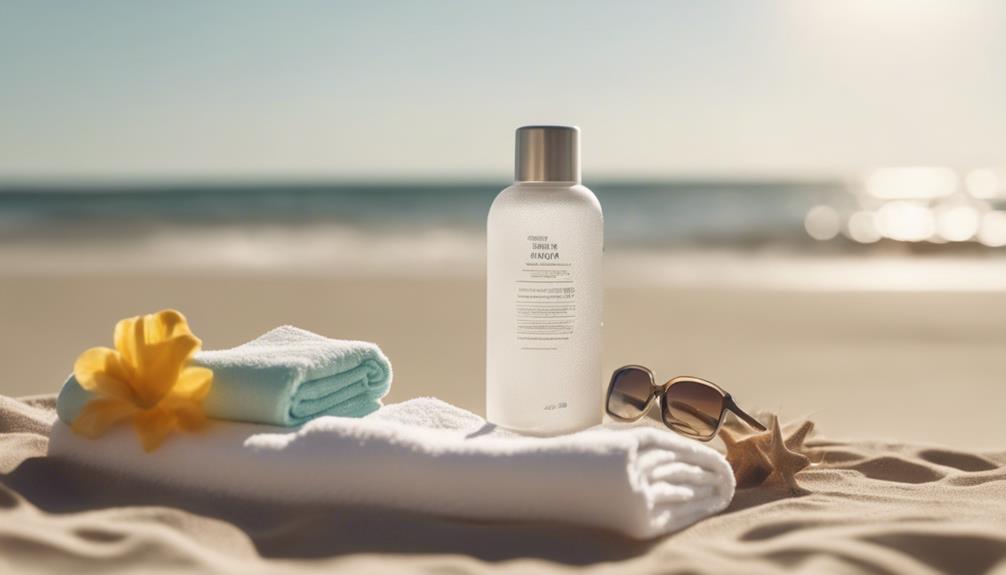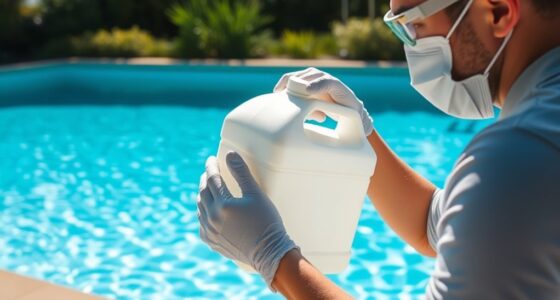To effectively combat pool algae, it is important to focus on maintaining a proper chemical balance and optimizing water circulation. Regularly testing chlorine and pH levels, along with ensuring thorough filter maintenance, is key. Implementing a routine cleaning schedule to avoid algae buildup is also crucial. Utilizing chlorine shock and algaecides for removal, in addition to manual techniques such as brushing and vacuuming, is recommended. Taking immediate action is necessary to prevent algae from spreading. Advanced technologies like ultrasonic control systems and UV-C sanitizers offer efficient solutions. Following expert advice on handling algae outbreaks helps in maintaining a pristine pool. Mastering algae control strategies is essential for a clean and healthy aquatic environment.
Key Takeaways
- Maintain proper chemical balance and water circulation.
- Regularly test chlorine and pH levels for pool health.
- Perform consistent filter maintenance to prevent algae growth.
- Implement thorough cleaning practices to deter algae buildup.
- Take immediate action with chlorine shock or algaecides for algae removal.
Understanding Pool Algae Growth
An in-depth understanding of the factors contributing to pool algae proliferation is essential for effective algae management in aquatic environments. Algae, a small plant-like organism, thrives in pools due to imbalanced chemicals, poor circulation, lack of maintenance, and environmental conditions.
Common types include green, black, and mustard algae. Proactive maintenance practices play a pivotal role in algae prevention, requiring regular testing, balanced water chemistry, filter upkeep, and routine cleaning.
To combat algae growth effectively, it is vital to understand the causes and implement preventive measures. By addressing these factors, pool owners can maintain a clean and healthy aquatic environment, ensuring an enjoyable swimming experience for all.
Essential Algae Prevention Strategies
Maintaining proper chemical balance and optimizing water circulation are essential strategies for preventing algae growth in pools. Regular testing of chlorine and pH levels, along with filter maintenance and effective water circulation, are vital for pool health. Routine cleaning, brushing, vacuuming, and equipment inspections help deter algae buildup. Diligent adherence to these prevention strategies reduces the risk of algae growth. To provide a clear overview of essential algae prevention strategies, a table is included below:
| Preventive Measures | Description |
|---|---|
| Maintain Chemical Balance | Regularly test chlorine and pH levels to optimize they are within the best range for pools. |
| Optimize Water Circulation | Proper water circulation prevents stagnant spots where algae can thrive. |
Effective Algae Removal Solutions

To effectively eliminate algae from pools, utilizing chlorine shock and algaecides is a recommended chemical treatment method. These solutions help in breaking down algae colonies and preventing their regrowth.
Here are some effective algae removal solutions to take into account:
- Chlorine Shock: Kills algae and prevents its spread.
- Algaecides: Specifically designed to target and eliminate algae.
- Manual Removal Techniques: Brushing, vacuuming, and cleaning pool accessories aid in algae elimination.
- Immediate Action: Promptly addressing algae outbreaks is essential for preventing further contamination and restoring water clarity.
Importance of Immediate Action
Taking swift action is essential when addressing algae outbreaks in pools to prevent further contamination and maintain water clarity. Algae can rapidly multiply, leading to unsightly pool conditions and potential health hazards. Immediate intervention, such as applying chlorine shock or algaecides, along with manual removal techniques like brushing and vacuuming, is vital to halt algae growth.
Delayed action can result in algae spreading and becoming more challenging to eradicate, requiring more extensive treatments and resources. By acting promptly upon noticing any signs of algae, pool owners can effectively control outbreaks, restore water quality, and create a safe swimming environment.
Timely response and thorough cleaning practices are fundamental in combating algae and preserving a pristine pool appearance.
Utilizing Advanced Algae Measures

Utilizing specialized equipment and advanced technologies is crucial in effectively combating stubborn algae problems in pools. Implementing cutting-edge measures can provide efficient solutions to eradicate algae and maintain a pristine pool environment.
Here are four advanced algae measures to contemplate:
- Ultrasonic Algae Control Systems: Utilize ultrasonic waves to disrupt algae growth, preventing its proliferation.
- Robotic Pool Cleaners: Autonomous cleaners equipped with scrubbing brushes and advanced filtration systems to target and remove algae.
- UV-C Sanitizers: Utilize UV-C light to kill algae cells and inhibit their reproduction, improving water quality.
- Chemical Automation Systems: Automated systems for precise chemical dosing, ensuring optimal water conditions to prevent algae development.
Sustaining an Algae-free Environment
Maintaining an algae-free setting in pools demands consistent adherence to preventive measures and diligent upkeep practices. To sustain a pristine pool, it is essential to regularly test and balance chlorine and pH levels, guarantee proper water circulation, and conduct routine filter maintenance.
Additionally, implementing thorough cleaning routines, including brushing, vacuuming, and equipment inspections, helps prevent algae buildup. Promptly addressing any signs of algae growth is vital to control outbreaks effectively.
Expert Assistance for Algae Control

For effective management of algae in pools, seeking expert guidance is recommended. When faced with persistent algae problems, professional pool cleaners can provide advanced solutions to combat stubborn outbreaks. Here are key reasons why expert guidance is important in algae control:
- Specialized Knowledge: Pool professionals possess in-depth expertise of algae types and effective removal techniques.
- Advanced Equipment: Professionals have specialized tools and machinery to efficiently eliminate algae from pools.
- Tailored Solutions: Expert guidance offers customized approaches based on the specific algae issue and pool conditions.
- Long-Term Maintenance: Professional support ensures ongoing upkeep to prevent future algae growth, maintaining a pristine pool environment.
Frequently Asked Questions
Can Algae Growth Be Caused by Specific Types of Pool Materials?
Algae growth in pools can be influenced by specific types of pool materials. Factors such as surface texture, porosity, and chemical reactivity of materials can create environments conducive to algae growth. Proper material selection is essential for algae prevention.
Is Algae Growth More Common in Indoor or Outdoor Pools?
Algae growth is typically more common in outdoor pools due to increased exposure to sunlight and environmental factors. Proper maintenance, chemical balance, and regular cleaning are essential for preventing algae outbreaks in both indoor and outdoor pools.
Can Algae Be Harmful to Swimmers' Health?
Algae in pools can pose health risks to swimmers. Certain types of algae can cause skin irritation, respiratory issues, and infections. It is essential to promptly address algae growth through proper maintenance and treatment to guarantee a safe swimming environment.
Are There Natural Remedies to Prevent Algae Growth in Pools?
Natural remedies like baking soda, borax, and hydrogen peroxide can help prevent algae growth in pools. However, maintaining proper chemical balance, water circulation, and regular cleaning are fundamental for effective algae prevention. Professional assistance guarantees thorough pool care.
How Often Should Pool Filters Be Replaced to Prevent Algae?
To prevent algae growth in pools, pool filters should be replaced according to manufacturer recommendations, typically every 1-2 years. Regular filter maintenance, proper circulation, and balanced chemicals are essential for effective algae prevention and pool maintenance.
What Are Some Expert Tips for Tackling Common Pool Problems Like Algae?
When dealing with shoreline pools common pool problems like algae, make sure to regularly shock the pool to kill any existing algae and prevent its growth. Keep the pool’s chemical levels balanced and clean the pool filter frequently to maintain a healthy and algae-free swimming environment.
Conclusion
In the battle against pool algae, watchfulness and proactive measures are key to maintaining a pristine aquatic oasis. By understanding the factors contributing to algae growth, implementing prevention strategies, and utilizing effective removal solutions, pool owners can guarantee a sparkling and inviting environment.
With immediate action and the utilization of advanced algae measures, a consistently algae-free pool can be achieved, promoting peak pool health and enhancing the overall enjoyment of the water feature.










